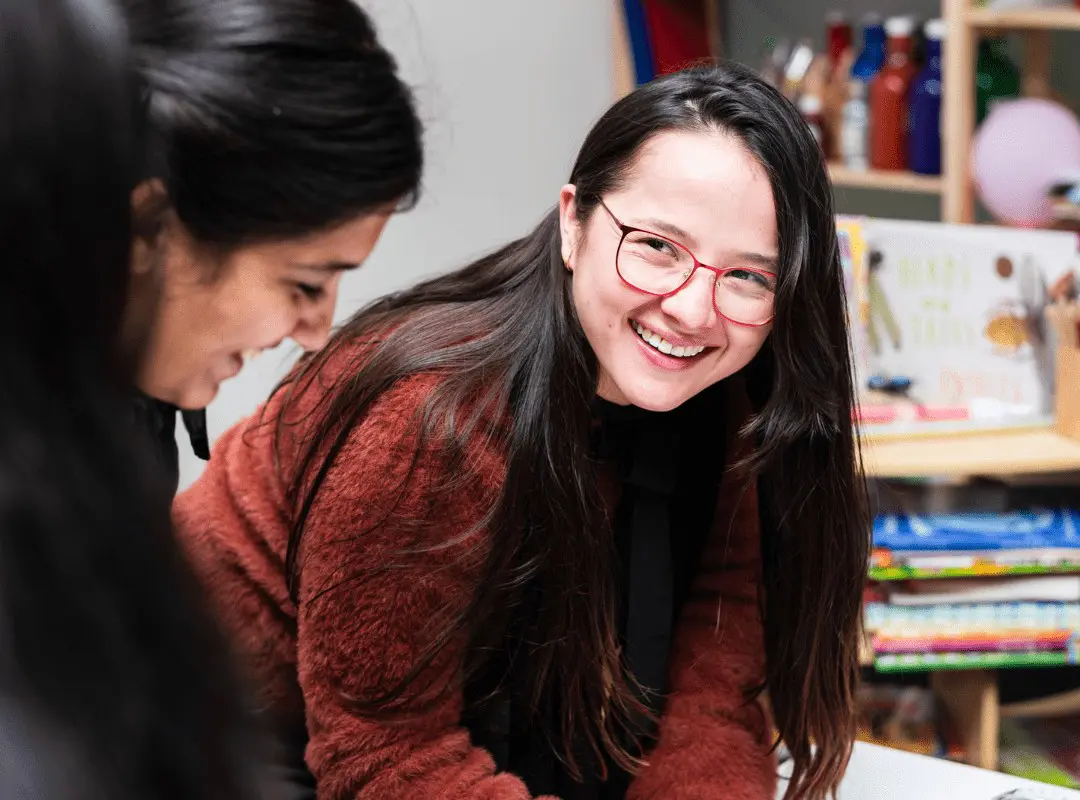Course Overview
Our Master of Education (Early Childhood) is an integrated, progressive postgraduate program of study comprising a nested Graduate Diploma and Graduate Certificate. At Ikon, we consider learning to be a lifelong skill. Whether you are already qualified as an early childhood teacher, or more broadly in education, these programs will prepare you to pursue leadership positions or explore roles in other areas of education, such as a specialised teaching professional, policy maker, education administrator, higher education academic, or educational researcher.
These courses provide you with advanced theoretical knowledge, pedagogical constructs, leadership skills and contemporary professional principles and practices for children aged birth to 8 years.
Throughout your learning you will develop specialist knowledge in contemporary early childhood educational contexts; playful pedagogies; thinking, creativity and curriculum; agentic digital citizenship; sustainability, kinship and nature; place pedagogy and community connections; operational service management; diverse learning and inclusive practices; wellbeing and trauma informed practices; leadership of educational contexts; and practitioner inquiry and research within the field of early childhood education.
These courses prepare you to be a confident and influential leader, equipped to advance and transform early childhood education in Australia and internationally.
This qualification is FEE-HELP approved for eligible applicants.
Key Information
| Award | Master of Education (Early Childhood) |
| Duration | 1.4 Years Full Time (or 2.8 Years Part-Time) |
| Study Mode | Online |
| Locations | Online |
| Intakes | February, May, September |
| Course Fees | Domestic (FEE-HELP available) International |
Trimester 2, 2026 Applications Now Open
Career Opportunities
Our Master of Education (Early Childhood), with its nested Graduate Diploma and Graduate Certificate meets the professional needs of aspiring teachers seeking lead teaching and curriculum positions, service director leadership and management roles, education administrator roles, higher education academic or educational research positions.
The Master of Education (Early Childhood) is not designed to be a graduate pre-service teacher education course and therefore is not professionally accredited by the Australian Children’s Education and Care Quality Authority as an approved early childhood qualification for Early Childhood Teachers nor does the course meet the national standards required for graduates to be registered as teachers in Victoria.
If you want to become a qualified Early Childhood Teacher, consider applying for our Bachelor of Early Childhood Education.

Course Structure
The Master of Education (Early Childhood) comprises 12 equally weighted subjects of 6 credit points each (total of 72 credit points) delivered over four trimesters.
The Graduate Diploma (Early Childhood) comprises 8 equally weighted subjects of 6 credit points each (total of 48 credit points) delivered over four trimesters.
The Graduate Certificate in Education (Early Childhood) comprises 4 equally weighted subjects of 6 credit points each delivered over two trimesters.
A typical full-time load is 9 subjects per year across three trimesters. The minimum number of subjects per trimester is 1.
Each trimester consists of twelve weeks of teaching.
Delivery & Workload
Course delivery for the The Master of Education (Early Childhood) is a self-paced combination of lectures, tutorials, discussions, assessment activities and independent study.
You should allow a notional 10-12 hours per week for each subject studied.
Subjects
Trimester 1
Trimester 2
Trimester 3
Trimester 4
In this subject students will explore and critically engage with the multifaceted landscape of contemporary early childhood educational contexts. This subject offers a comprehensive examination of the evolving roles, responsibilities, and ethical considerations within the early childhood profession.
Students will gain valuable insights for enhancing their practice through critical reflection and evaluation, fostering inclusion, promoting social justice, and contributing to the wellbeing of young children. Students will investigate various contemporary perspectives and practices that define the professional journey of early childhood teachers and educators. Through a combination of readings, discussions, practical exercises and practitioner inquiry projects students will gain advanced and specialised knowledge and skills in analysing and critiquing contemporary perspectives; navigating ethical frameworks; applying professional standards; advocating for children’s rights; integrating Australian First Nations perspectives; and engaging in practitioner inquiry in early childhood education practices.
Subject Code: EPRO581
Credit Points: 6
Assessments: Communities of Practice Forum (50%), Practitioner Inquiry Project (50%)
In this subject students will explore the dynamic and transformative role of play and creativity in early childhood education. Students will critically examine and synthesise worldviews, theories, philosophies, and perspectives on play and playful pedagogies within the context of early years education.
Students will investigate the multifaceted dimensions of play as a fundamental teaching and learning medium for facilitating young children’s wellbeing, health, development and curriculum provision. This is achieved through exploring the principles of play and learning; embracing playful pedagogies; engaging intentionally in play; interpreting diverse perspectives on play; designing playful curricula; and promoting playful inquiry-based learning for young children. Students will gain expertise and advanced insight in the application of playful pedagogies as a foundation of all teaching and learning approaches; and comprehending that playful pedagogies are more than a teaching technique, they become a deep and transformative educational approach in early childhood curriculum provision.
Subject Code: EPED582
Credit Points: 6
Assessments: Digital Journal (40%), Essay (30%), Presentation (30%)
In today’s rapidly evolving educational landscape, early childhood professionals need to equip themselves with a deep understanding of how young children think, learn, and create. In this subject, students will gain a comprehensive understanding of the critical role that thinking skills, creativity, and curriculum provision play in the early years context.
As early childhood professionals, students will explore various perspectives and approaches to foster young children’s cognitive development, creativity, and overall learning experiences. Throughout this subject students will examine and synthesise the key areas of thinking skills and creativity; developmental foundations of thinking and creativity; worldviews, theories, and perspectives related to neuroscience, cognitive development, intelligence, learning, executive function, theory of mind, self-regulation, metacognition, and neurodivergence; pedagogic practices, curriculum design and integrated learning opportunities to design and create playful inquiry-based curricula for young children. This subject also challenges students to think critically, engage in reflective practice, and develop a pedagogical toolkit that empowers them to be transformative early childhood professionals.
Subject Code: EPED583
Credit Points: 6
Assessments: Report (30%), Creative Work (30%), Literacy Curriculum Resource (40%)
In this subject students will gain insight into the multifaceted world of inclusive education and its vital role in enriching the experiences of all children in early childhood settings. As early childhood professionals, it is imperative to create environments where all children, regardless of their abilities, backgrounds, or circumstances, have the opportunity to thrive and reach their full potential.
Inclusive education not only benefits children with diverse needs but also fosters a sense of belonging and respect for differences among all children. This subject is designed to provide students with a comprehensive understanding of key theories, perspectives, practices, and frameworks that inform inclusive education in the context of early childhood education. Students will examine the significance of family, child, multi-and-trans-disciplinary professionals and community perspectives in designing and constructing inclusive educational settings. Furthermore, students will explore the role of educational leadership and scholarship in applying and sustaining an inclusive culture, approaches, perspectives, and teaching practices in early childhood contexts where every child’s unique abilities and backgrounds are celebrated and supported.
Subject Code: EPRO584
Credit Points: 6
Assessments: Publication Article & Book Review (40%), Multimedia Presentation (20%), Inclusive Education Framework (40%)
In today’s contemporary early childhood contexts, it is paramount to recognise the impact of trauma and stress on children’s brains, development, and capacity for learning. The ability to support the wellbeing and resilience of young children is a critical skillset for any early childhood professional. This subject will provide students with the in-depth knowledge and advanced skills to comprehend and address the intricate relationship between wellbeing and trauma in the lives of young children.
Students will examine the types, causes and categories of trauma and stress experienced by young children; the impact of trauma and adversity on young children’s brains and learning; the importance of building relationships for safety and wellbeing; and trauma responsive practices in action through the provision of conducive learning environments. This subject aims to provide early childhood professionals with the advanced knowledge and specialised skills required to create a nurturing, safe, and supportive environment for young children affected by trauma. By doing so, students will contribute to the healthy development, successful learning experiences, and positive wellbeing of all children in early childhood educational contexts.
Subject Code: EPRO585
Credit Points: 6
Assessments: Case Studies Report (30%), Multimedia Presentation (30%), Publication (e-book) (40%)
In today’s rapidly changing world, it is essential to equip early childhood professionals with the knowledge and skills needed to foster a deep connection between young children and the natural environment. This subject provides an in-depth exploration of the multifaceted relationship between young children, sustainability, kinship, and nature in early childhood settings to facilitate activism, agency, and holistic learning experiences. It is designed to provide students with a comprehensive understanding of sustainability, kinship, and nature in early childhood education.
Through examining various aspects of this dynamic field, students will gain the expert knowledge and skills necessary to create immersive nature play experiences that empower young children as active agents of change. Through a combination of readings, discussions, practical exercises, and case studies, students will be well-equipped to foster a generation of children who are environmentally conscious and active advocates connected with the natural world.
Subject Code: EPED586
Credit Points: 6
Assessments: Essay (40%), Curriculum Resource (30%), Publication (e-book) (30%)
In today’s rapidly evolving digital landscape, young children are growing up in a world where digital technologies are an integral part of their daily lives. As professionals in the field of early childhood education, they have a responsibility to guide and empower children to become informed, responsible, and active digital citizens. In this subject students will investigate global perspectives and theories on citizenship, digital citizenship, and their relevance in early childhood contexts.
Students will examine Australian guidelines for emerging foundational digital citizenship practices in early childhood education. This subject explores contemporary digital frameworks that guide pedagogical practices in early childhood, emphasising the connections between rights, children’s agency, digital citizenship frameworks, and curriculum development. This subject will provide students with the advanced knowledge and skills necessary to effectively navigate the complex terrain of digital provision, protection, and participation in early childhood education. Students will investigate strategies for resourcing the learning environment to support digital pedagogy and facilitate the agentic child’s role as both a consumer and creator of digital knowledge across the curriculum. They will also investigate the importance building partnerships with stakeholders to establish digital citizenship and agency within early childhood contexts.
Subject Code: EPED587
Credit Points: 6
Assessments: Literature Review (50%), Digital Curriculum Resource (50%)
In this subject, students will gain a comprehensive understanding of the principles, paradigms, and In this subject, students will gain a comprehensive understanding of the principles, paradigms, and practices of educational practitioner inquiry and research, with a particular focus on how it informs and improves teaching, learning, personal and professional growth within the context of early childhood education.
Students will enhance their ability to reflect on and extend their professional practices through valuable experience with the practitioner inquiry and research process. Throughout this research subject, students will engage in a blend of theoretical learning, hands-on research activities, group discussions, and reflective exercises to engage in practitioner inquiry research with an emphasis on critical thinking, research competence, ethical awareness, and communication skills. The subject will prepare students to embark on their own practitioner inquiry journey and contribute to the advancement of knowledge and practice in early childhood education.
Subject Code: EPIR588
Credit Points: 6
Assessments: Research Plan (20%), Practitioner Inquiry Research Proposal (60%), Research and Ethics Committee Interview (20%)
In today’s rapidly evolving educational landscape, operational management plays a pivotal role in ensuring the delivery of high-quality services to all stakeholders involved in early childhood education. In this subject, students will engage in a comprehensive examination of the knowledge and skills required to effectively manage and administer early childhood educational settings. This subject provides students with a deep understanding of various aspects of operational management within early childhood educational contexts, empowering them to make informed decisions, drive positive change, and ensure the highest standards of quality in early childhood educational contexts.
Subject Code: ELDR589
Credit Points: 6
Assessments: Case Studies Analysis (30%), Operational Management Plan (50%), Report (20%)
In this subject, students will explore the dynamic interplay between empathy development, place-based education and community connections in the context of early childhood education. Grounded in the principles of Place-Based Early Childhood Education, this subject provides students with a comprehensive understanding of how these three elements synergise to create a rich and meaningful educational experience for young children. Students will examine the theory and practice of early childhood education, emphasising the critical role that empathy, place-based pedagogy, and community engagement play in shaping young learners’ educational journeys. Through a blend of theoretical exploration, empirical research, case studies and hands-on experience, students will gain the tools and insights necessary to foster empathy, create place-based learning environments, and establish strong community connections within early childhood education settings.
Subject Code: EPED590
Credit Points: 6
Assessments: Essay (30%), Multimedia Presentation (20%), Framework + Curriculum Design (50%)
Leadership in early childhood education goes beyond mere management; it encompasses the ability to inspire, guide, and facilitate the growth and development of young learners, educators, and the broader community. In this subject, students will explore the critical role of leadership in early childhood education and its significance in ensuring quality service provision for all stakeholders; various aspects of leadership, contemporary models and styles; and the emotional intelligences required for effective leadership in the early childhood education field. Throughout this subject, students will be encouraged to reflect on their own leadership capabilities, both in theory and in practice, and to develop strategies for enhancing their leadership skills in early childhood educational contexts.
Subject Code: ELDR591
Credit Points: 6
Assessments: Communities of Practice (50%), Presentation (50%)
This subject is the culmination of the student’s journey in practitioner research, building upon the foundational concepts and skills introduced in Research A: Introduction to Practitioner Research. Students will undertake a substantial research project in their professional field. The Practitioner Research Project places a strong emphasis on practical application, scholarly rigor, and the integration of research paradigms, methods, and theories relevant to the early childhood field. Throughout this subject, students will be guided by experienced faculty, supported by a community of peers and undertake a project that may contribute to the advancement of both the early childhood profession and the wider academic community.
Subject Code: EPIR592
Credit Points: 6
Pre-Requisites: EPIR588 Research A: Introduction to Practitioner Research
Assessments: Research Report Journal Publication (60%), Research Project Presentations (40%)

Recognition of Prior Learning (RPL)
At Ikon, your past studies or work experience can be acknowledged through Recognition of Prior Learning (RPL) or Credit Transfer.
RPL evaluates your previous skills and experience against the learning outcomes of Ikon subjects, potentially exempting you from studying certain subjects. Credit Transfer allows your previous studies to contribute towards your qualification, granting credits based on matched content and learning outcomes between equivalent qualifications. These pathways could help you to fast track your qualification, reducing study time and tuition fees.
Exit Pathways
Students enrolled into the Master of Education (Early Childhood) may exit with a Graduate Certificate in Education (Early Childhood) or Graduate Diploma of Education (Early Childhood) if they have successfully completed the subjects listed below.
EPRO581 Contemporary Early Childhood Educational Contexts
EPED582 Playful Pedagogies in Early Childhood Education
EPED583 Thinking, Creativity and Curriculum in Early Childhood Education
EPRO584 Diverse Learning and Inclusive Education in Early Childhood Contexts
Exit Point – Graduate Certificate in Education (Early Childhood)
EPRO585 Wellbeing, Trauma and Responsive Practices in Early Childhood Educational Contexts
EPED586 Sustainability, Kinship and Nature in Early Childhood Education
EPED587 Agentic Digital Citizenship in Early Childhood Education
EPIR588 Research A: Introduction to Practitioner Research
Exit Point – Graduate Diploma of Education (Early Childhood)
ELDR589 Operational Management of Early Childhood Educational Contexts
EPED590 Empathy, Place and Community Connections in Early Childhood Education
ELDR591 Leadership of Early Childhood Educational Contexts
EPIR592 Research B: Practitioner Research Project
Master of Education (Early Childhood)

Entry Requirements
Domestic Students
International Students
Academic Requirements
Applicants must have either:
- a Bachelor of Education (Early Childhood) or equivalent qualification and either the completion of postgraduate studies in education, or professional experience equivalent to one year full-time in early childhood education; or
- a Bachelor degree and either the Graduate Diploma of Education (Early Childhood) or Graduate Diploma of Teaching (Early Childhood) or Master of Teaching (Early Childhood) and professional experience equivalent to one year full-time in early childhood education; or
- an equivalent overseas higher education qualification in early childhood and professional experience equivalent to one year full-time in early childhood education.
Inherent Requirements
Applicants are required to provide an updated copy of their CV.
Academic Requirements
Applicants must have either:
- a Bachelor of Education (Early Childhood) or equivalent qualification and either the completion of postgraduate studies in education, or professional experience equivalent to one year full-time in early childhood education; or
- a Bachelor degree and either the Graduate Diploma of Education (Early Childhood) or Graduate Diploma of Teaching (Early Childhood) or Master of Teaching (Early Childhood) and professional experience equivalent to one year full-time in early childhood education; or
- an equivalent overseas higher education qualification in early childhood and professional experience equivalent to one year full-time in early childhood education.
Inherent Requirements
Applicants must demonstrate they can meet the inherent requirements needed to successfully complete the course: ethical behaviour, behavioural stability, legal compliance, communication skills, cognitive skills, literacy (language) skills, relational skills, reflective skills, sensory abilities, strength and mobility and sustainable performance. To demonstrate this, applicants will need to complete an online questionnaire as part of the application process.
English Language Proficiency
Equivalent IELTS 6.5 (Academic) with speaking no less than 6.5, Listening, Writing and Reading no less than 6.0.
Find Out More!
Contact us and find out more about the Master of Education (Early Childhood).

